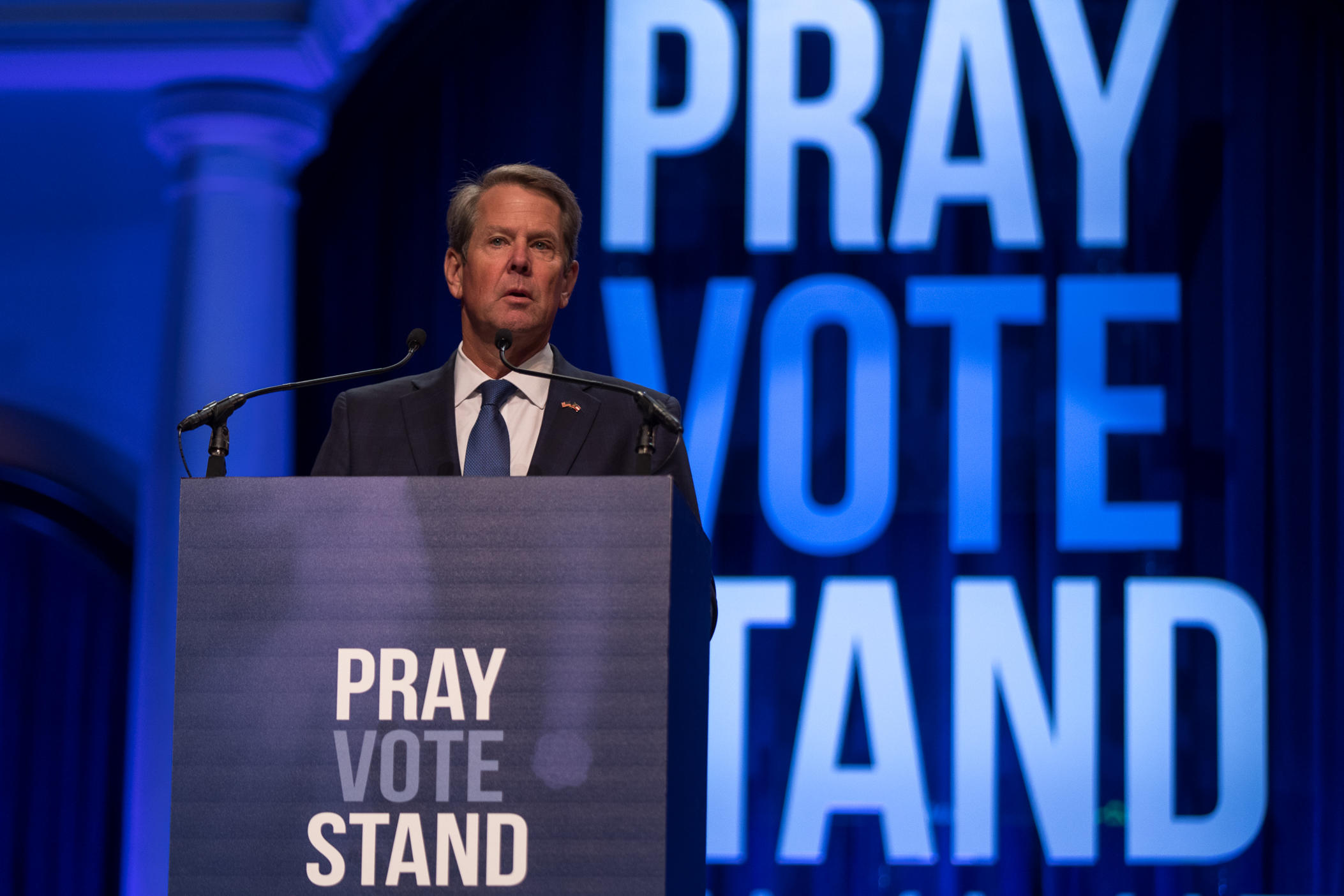Section Branding
Header Content
At conservative Christian conference, Kemp skirts mention of Georgia’s anti-abortion law
Primary Content
At a conservative Christian conference on Thursday, Gov. Brian Kemp touted the state’s economy during the pandemic, a crackdown on human trafficking and last year’s election overhaul.
But he gave little attention to Georgia’s 2019 abortion law that took effect in July after the Supreme Court overturned Roe v Wade.
Kemp only mentioned the law once during his 12-minute speech and then quickly pivoted to other initiatives.
“We believe we need to protect life at many stages,” he said. “You know we passed the Heartbeat Bill here, but we've also done adoption reform. We have done foster care reform.”
The Pray Vote Stand Summit at First Baptist Church Atlanta in Dunwoody is a three-day event focused on topics including "protecting the unborn, the importance of the nuclear family, and domestic and international religious liberty." Its agenda features speakers known for anti-abortion and anti-LGBTQ views, and programming this year emphasized anti-transgender policies.
The Family Research Council, the national faith-based nonprofit that organized the event, has been designated as a “hate group” by the Southern Poverty Law Center for its anti-LGBTQ rhetoric.
During his address to the far-right, conservative crowd, the governor still followed a trend of Republicans staying largely quiet on the issue despite abortion rights taking center stage in this year’s midterm election.
The debate has been thrust into the center of Georgia’s statewide campaigns after the Supreme Court’s decision to rollback federal abortion protections. Particularly for Democrats, who are betting that anger over the state law will mobilize their base and even win over some moderate and swing voters.
In Georgia, the Supreme Court’s ruling meant the state’s 2019 abortion law, which had been held up for three years in the courts, was given the green flag to immediately take effect after a federal appeals court panel decided it was lawful.
A recent poll by the Atlanta Journal-Constitution showed that more than half of voters do not support the state's new abortion law.
The newfound power of states to create the rules around abortion care has cast an even brighter spotlight on the governor’s race. But Kemp has stayed away from the topic on the campaign trail – caught in a tight rematch against Democrat Stacey Abrams.
Instead, at the faith-based event centered on abortion he stressed to attendees the importance of showing up at the ballot box in November.
“As all of you know, we have a big election coming up and there's a lot at stake,” he said. “Because Stacey Abrams, quite honestly, would take our state in a completely different direction.”
The Republican governor pointed to Democratic gains in the past few years – in 2020 Georgia voters shocked the country when they backed Democrat President Joe Biden and sent two Democrats to represent them in the U.S. Senate.
“This election is too important for anyone to be sitting on the sidelines because I can guarantee you the other side is working,” he said. “And quite honestly, they have outworked us the last several cycles.”
Democrats are optimistic that the state's abortion law will give them an edge in November and has the potential to deter even Republican women.
"I think what Kemp's team, in this really extreme ban, has missed is that we have, 'pro-life women,' Republican women who move away from Kemp on this issue because of its extremism," said Abrams' campaign manager Lauren Groh-Wargo on GPB's Political Rewind.
Even if Abrams is elected, the Georgia General Assembly is handily controlled by Republicans and it is unclear what – if any – additional abortion restrictions the legislature might introduce next session, which starts in January.
Democrats and advocates worry that the Supreme Court’s decision may not only open the door for stricter abortion measures but also open the door for rollbacks of LGBTQ rights.
They slammed the Republican for speaking at the event on Thursday.
“It shouldn’t be too much for LGBTQ Georgians to ask that our governor not align himself with hate groups and be complicit in bigotry against us,” said State Sen. Kim Jackson, D-Stone Mountain, an Episcopal priest and the first and only openly LGBTQ state senator.
Lawmakers passed legislation last session aimed at transgender athletes. The law gave the Georgia High School Association the power to prevent transgender athletes from playing on teams that align with their gender identities.


